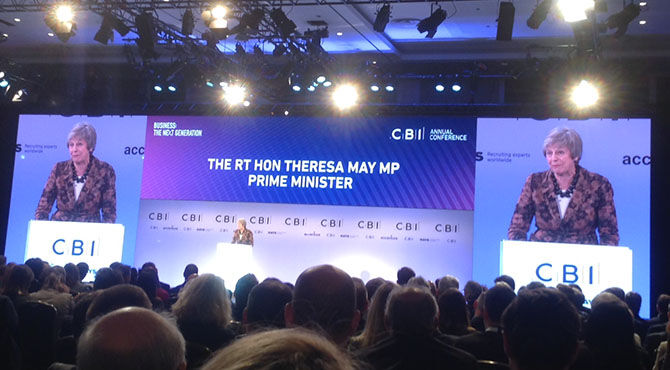May puts immigration at centre of Brexit deal
Embattled Prime Minister Theresa May has put future UK immigration controls at the centre of her defence of the controversial Brexit withdrawal agreement she has negotiated with Brussels.

 19 November 2018
19 November 2018Ironing out the technical details
She accepted, however, that there was "an intense week of negotiations ahead of us" to iron out detail in the draft agreement, which sets out the arrangements for the transitional period between March 29 next year, when the UK leaves the bloc, and the end of 2020, when the two sides hope to have a permanent trade deal in place...although Michel Barnier, the EU's chief Brexit negotiator, has reportedly suggested the transition period could continue until December 2022.Mrs May told the CBI that, between now and Sunday's European Council summit, "I expect us to hammer out the full and final details of the framework that will underpin our future relationship and I am confident that we can strike a deal at the council that I can take back to the House of Commons."The core elements of that deal are already in place. The withdrawal agreement has been agreed in full, subject of course to final agreement being reached on the future framework."It was never going to be easy or straight forward. And the final stage was always going to be the toughest. But let no one be in any doubt - I am determined to deliver it."Full control of UK border
Stressing the importance of the Brexit plan to future immigration policy, she said that while immigration would "continue to make a positive contribution" to UK life, post-Brexit policies would create a meritocratic, egalitarian system that would prevent EU27 nationals "jumping the queue" to get work in the UK and would help Britons get good jobs and training."Once we've left the EU we will be fully in control of who comes (to the UK). It will no longer be the case that EU nationals, regardless of the skills or experience they have to offer, can jump the queue ahead of engineers from Sydney or software developers from Delhi," she said."Instead of a system based on where a person is from, we will have one that is built around the talents and skills a person has to offer."Not only will this deliver on the verdict of the referendum, it should lead to greater opportunity for young people in this country to access training and skilled employment."Brexit for businesses is 'all consuming'
The deal won the backing of both John Allan, the CBI president, and Carolyn Fairbairn, the organisation's director-general. Though both said it was "not perfect", they called on MPs to back it or risk a catastrophic no-deal Brexit.With some hardline Tory MPs trying to oust Mrs May as prime minister, Ms Fairbairn told the conference that businesses were wasting billions in preparations for a 'no deal' scenario."Brexit is consuming government – every politician, every civil servant. And it is also consuming British business," she said."While other countries are forging a competitive future, Westminster seems to be living in its own narrow world, in which extreme positions are being allowed to dominate. The result is a high-stakes game of risk, where the outcome could be an accidental no-deal. Surely, we can do better than this."The prime minister’s agreement is not perfect. It is a compromise. But it is hard-won progress."The Brexit timeline
Questioned on the BBC about Mr Barnier's suggestion that the transition period could be extended until the end of 2022, Business Secretary Greg Clark said it might make sense but that "it would be at our request and that would be a maximum period".He added that it was more likely it could be extended for "weeks or months". He explained: "If we were six weeks away from concluding a future economic partnership and agreeing that, then it may make sense to extend the transition period."A prime reason for an extension is believed to be that it would give time for high-tech monitoring equipment to be installed along the Northern Ireland border to prevent a 'hard border' being created with the Republic once Brexit is finalised.Meanwhile, EU27 ministers arriving for a General Affairs Council meeting in Brussels, played down the prospects of any major changes to the withdrawal agreement. "This deal that is now on the table is the best there is. There is no better deal for this crazy Brexit," said Jean Asselborn, Luxembourg's foreign minister. "I think Theresa May deserves praise for her position."Gernot Blumel, Austria's EU minister, commented: "The withdrawal agreement on the table will now be closed. There have been long months of intensive and difficult negotiations and now what we will do is approve what is on the table."I believe this is the best possible compromise and I hope it will now receive consent on both sides."Visit our Brexit pages for all the latest Brexit news.
Relocate’s new Global Mobility Toolkit provides free information, practical advice and support for HR, global mobility managers and global teams operating overseas.
Access hundreds of global services and suppliers in our Online Directory
Subscribe to Relocate Extra, our monthly newsletter, to get all of the international assignments and global mobility news.
©2026 Re:locate magazine, published by Profile Locations, Spray Hill, Hastings Road, Lamberhurst, Kent TN3 8JB. All rights reserved. This publication (or any part thereof) may not be reproduced in any form without the prior written permission of Profile Locations. Profile Locations accepts no liability for the accuracy of the contents or any opinions expressed herein.





































